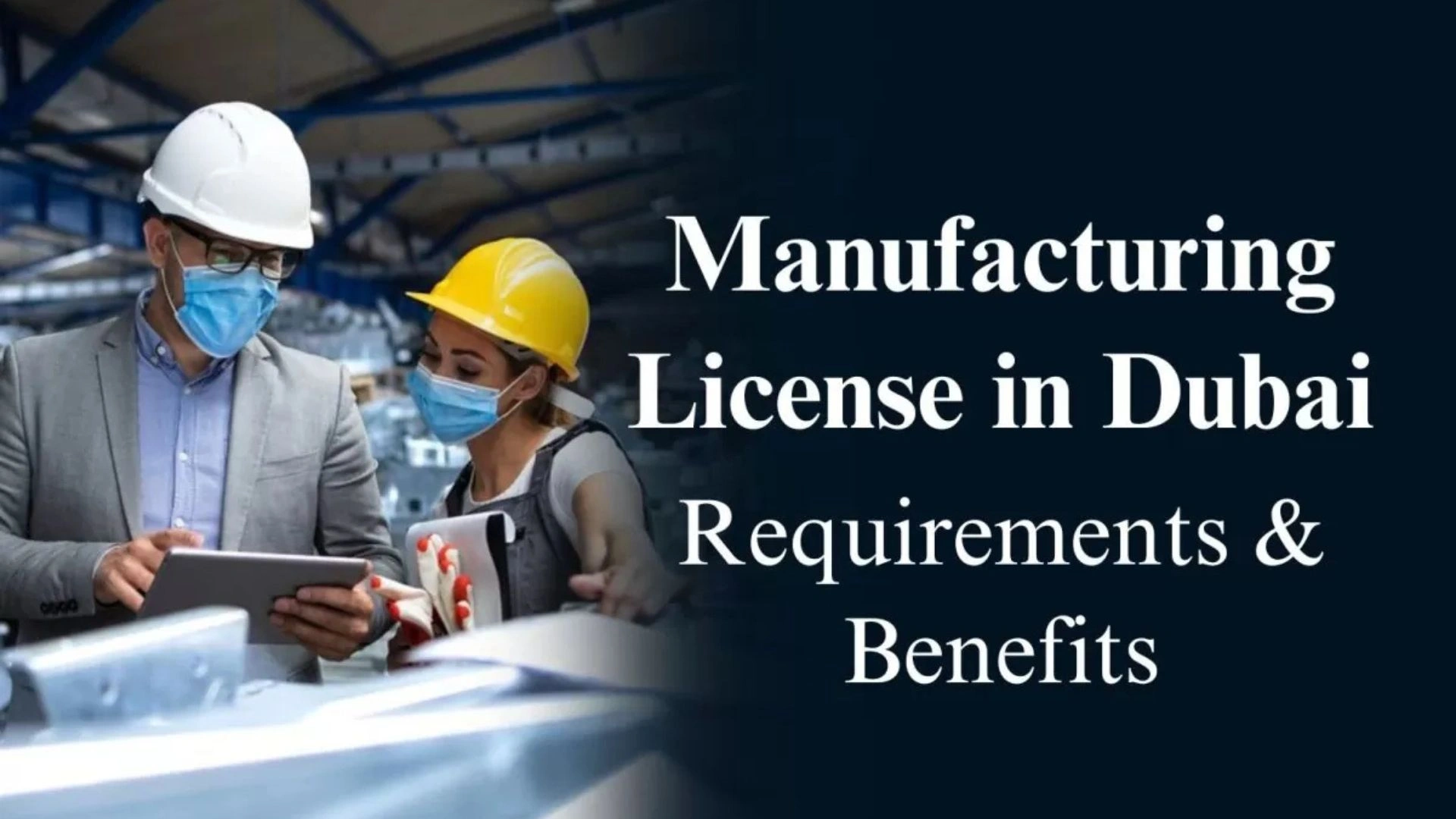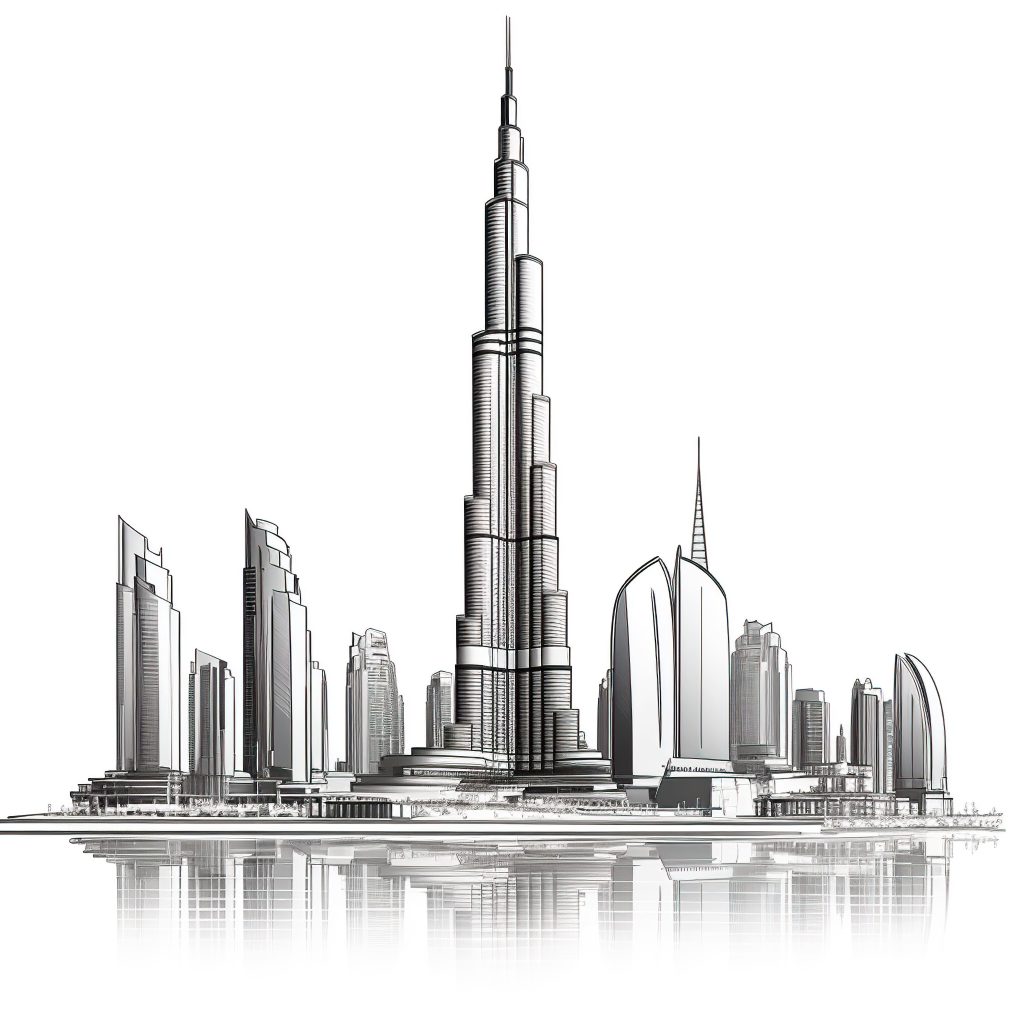Dubai has become a top manufacturing destination in the Middle East attracting many business owners.
The UAE government strongly supports industry growth through initiatives like “Operation 300bn” and “Make it in the Emirates.” Combine this support with Dubai’s 100% foreign ownership with tax benefits and you will see why businesses choose to manufacture their goods here.
This blog explains why Dubai is a great place for manufacturing and how to obtain a manufacturing license for your business.
What is a Manufacturing License?
A manufacturing license in Dubai is a legal permit your company needs to run a factory or produce goods. All UAE business permits fall into three types:
- Commercial license for trading.
- Professional license for services.
- Industrial license for manufacturing.
This license is required for any business that assembles or processes products. So ensure you have it, whether it’s light work like food processing or heavy industry like steel. And some key points about a manufacturing license include:
- It allows you to set up a production facility in Dubai and perform specific industrial tasks like furniture making or food production which must be listed on your license.
- It’s issued by the Department of Economy and Tourism (DET) for a mainland company or by the relevant Free Zone Authority.
- This license lasts for a year and must be renewed annually.
- You must have a factory or a warehouse in UAE unlike a service business. Authorities will inspect this location for safety and zoning before they issue your license.
- You should also get the Industrial Production Certificate from MoIAT after receiving your local industrial license. This officially registers your factory and qualifies you for benefits like exemptions on import taxes for machinery and raw materials.
The manufacturing license in short is a necessary legal document you must have to start production in Dubai. It’s your official permit to operate as a producer there.
Launch your manufacturing business with ease. Book a company formation in UAE consultation now.
Why Choose Dubai?
This country provides many key benefits for businesses planning to expand overseas:
(A)Great Location & Market Access
Dubai is a hub between countries like Asia and Europe. This gives manufacturers vast access to the Middle East and Europe. It’s great for global shipping with major facilities like Jebel Ali Port and Al Maktoum Airport ensuring fast logistics.
(B)Pro-Business Environment
UAE is politically stable and has rules that make it easy for investors to operate.
- Indian owners can now fully own their mainland business without needing a local partner.
- Taxes are low and you pay only 9% corporate tax on large profits plus a low 5% VAT.
- Over 40 specialised Free Zones offer easy setup and sometimes 0% corporate tax on certain income.
(C) Trade Benefits
The free trade deal between India and UAE means manufacturers in Dubai get significantly reduced or zero customs duties when trading with India. This cuts costs whether you are importing raw materials from India or exporting finished goods back.
(D) World-Class Infrastructure
Dubai has modern facilities like dedicated industrial parks and pre-built factories. It means your operations are guaranteed to run smoothly with reliable utilities and excellent connections.
(E) Government Support & Incentives
UAE’s government actively supports manufacturing. If you have an Industrial Production License then your factory can get tax discounts on imported machinery and raw materials which results in big savings on setup costs. Plus, programs like the National In-Country Value (ICV) favour local production for government contracts.
(F) Skilled Talent
Dubai has a skilled and diverse workforce with a vast community. Hiring is easy for companies due to availability of expatriate labour, streamlined visas and free zones allowing large visa quotas. This makes it easy to staff roles from junior workers to senior managers.
(G) Growth and Innovation
The UAE has a stable and growing economy. The government supports advanced technology which creates new opportunities in sectors like food processing and clean energy that suit foreign businesses.
Manufacturing License in Dubai Requirements?
Setting up a manufacturing business is harder than a simple trading company. Here is what you need before you can get your manufacturing license in Dubai:
Local Company Formation
- You must register a UAE company such as an LLC (Limited Liability Company).
- The great news is that you can now entirely own and control your Dubai factory without a local partner.
- You must draft and officially approve a Memorandum of Association (MOA) that clearly lists your industrial activities.
Industrial Space
- You must have a physical factory or industrial land in Dubai. This space must be suitable for manufacturing.
- You need a lease contract like an Ejari certificate on the mainland as proof of premises.
- Many free zones offer ready-made warehouses which makes this step easy. But its size and technical details must match your production needs.
Minimum Resources and Investment
- You should budget for a substantial investment for your establishment.
- Typically, factories applying for MoIAT benefits require a minimum workforce and operational capacity, often around 10 employees. Capital needed is INR 60 lakhs and this varies extremely by industry.
Safety Approvals
- Manufacturing requires extra permissions to ensure safety and environmental protection.
- You usually need approval from the Dubai Municipality to prove that your plant will not cause pollution.
- You need approval and a certificate from Civil Defense confirming that your factory meets all fire safety and protection standards.
- Some activities like food or pharmaceutical production will require extra approvals from specialised regulators like the Ministry of Health or Food Safety.
Documentation and Approvals
- Prepare all personal documents like passports along with company documents like the MOA and site lease.
- You must first get a preliminary Initial Approval Certificate from the licensing authority in DET or Free Zone. This acts as your official permit to proceed.
- Security checks on foreign shareholders are a standard part of this step.
You must adequately prepare your budget and paperwork to succeed. Many firms hire a Dubai consultant like DU Digital Global to help them through this process.
Need to Set Up Your Dubai Factory Fast? DU Global for quick and reliable service.
Manufacturing License in Dubai: A Step-by-Step Guide
Getting the manufacturing license involves a few steps once your documents are ready. And here are those steps:
Step 1: Choose Location and Legal Structure
You must first decide where to set up your factory. Choose the Mainland Zone if you plan to sell across the entire UAE or to the government. Choose a Free Zone if your focus is mainly on export or if you want a quicker setup.
Do some research to find out which Zone is best for your industry. Then reserve a unique trade name with the licensing authority once you have selected your zone.
Step 2: Get Approval
Apply for initial approval to the relevant authority. This application must include key details like your company name and the product you manufacture.
You will receive an Initial Approval Certificate once approved. It’s your official government pass to move forward. You may also need preliminary clearance for things like environmental safety or a feasibility study for heavy industries. But this step is simple for general manufacturing goods like garments.
Step 3: Acquire Industrial Premises
You must now finalise your factory location after approval. Sign the lease or agreement once you find the right space. Authorities like the Civil Defense may inspect your premises to ensure they meet the safety standards. Choose a location in a designated industrial area to avoid zoning problems.
Prepare and sign the Memorandum of Association detailing shareholders and company goals at this stage. And submit it with the lease documents.
Step 4: Finalise Licensing and Fees
Now submit the whole license application package including the initial approval and all collected external approvals. Submit this to the relevant authority and pay the license fees.
This process takes a few weeks since it requires inspections and regulatory approvals. An inspector will visit your site to check that the basic layout and safety equipment are installed.
Step 5: Receive Your License
The authority will issue your license once all approvals are complete. Your company is now legally ready to start manufacturing. You get a Trade License from the Dubai DET or a Free Zone that officially allows you to begin your operations.
Keep in mind the license is valid for one year and may have special conditions like environmental compliance. You must also register for VAT if your annual sales exceed INR 90 lakhs and comply with corporate tax requirements.
Step 6: Obtain Additional Permits
Some final approvals happen after the trade license is issued. The license letter might list requirements you need to meet after you get the license such as final environmental permits or clearance from Civil Defense once your equipment is installed. You should immediately apply for the MoIAT Industrial Production Certificate.
You can apply online for the MoIAT Industrial Production Certificate and apply for this federal certificate once your Dubai license is active. The process is quick and takes about 15 business days. This MoIAT certificate is crucial because it grants your factory customs duty exemptions on imported machinery and raw materials.
Step 7: Arrange Visas and Staffing
You can now sponsor residence visas for yourself and your employees with the manufacturing license. An industrial production license allows for many visas whose number depends on your facility size. You can bring in skilled workers who require staff work permits.
Complete all necessary labour and immigration registrations like the establishment card and make sure to adhere to the UAE’s labour law.
Step 8: Commence Operations and Stay Compliant
You can now install your machines and start producing goods. But you must remember your ongoing duties. Your Industrial License must be renewed annually which requires an active lease and payment.
The MoIAT certificate also needs to be renewed every 1 to 3 years with an inspection. Always follow safety rules and keep accurate tax records. Staying compliant ensures a smooth operation and access to all of Dubai’s benefits.
Dubai has a faster licensing process that allows many steps to be completed online or simultaneously. This guide provides a clear path to licensing your factory in Dubai.
Ready to start your business in Dubai? Pick our experts for a swift apply.
Cost of Manufacturing license in Dubai
The cost of establishing a manufacturing business in Dubai falls into two main categories: license fees and setup expenses.
- Industrial License Fee
The cost for the official manufacturing license is typically INR 3-7 lakhs (AED 13,000-30,000 approx.) for the first year. The exact price depends on your location and manufacturing type. This fee generally covers your license and initial approval.
- Rent for Factory or Warehouse
It’s the biggest expense. Rent depends entirely on the size and location. A small warehouse may cost INR 14 lakhs+ per year (AED 60,000+ yearly). You should generally plan for at least one year of rent in advance.
- Machinery and Equipment
Buying or importing your machinery incurs significant costs. But you can usually waive the 5% customs duty on this imported equipment and save money if you have the federal Industrial Production Certificate.
- Visas and Staffing
Budget about INR 24,000 to INR 36,000 per employee for the initial residency visa and paperwork. Multiply this by the number of workers you are planning to hire.
- Professional Fees
You must include service fees if you hire a consultant or law firm for the setup. These fees can range from INR 1,20,000 to AED 150,000+ (≈ INR 2.7 lakh to INR 34 lakh depending on scope).
- Additional Approvals
External approvals come with their own fees. A Civil Defense fire safety inspection can cost a few thousand dirhams. But the MoIAT industrial license fee is minimal. Other costs like fees for environmental permits are variable and depend on your specific case.
Typical Charges
- Civil Defence Fire Safety Inspection: AED 2,000–5,000
- Dubai Municipality Environmental NOC: Variable based on process
- MoIAT Industrial Production Certificate fee:
- AED 750–2,000 (inspection + application)
Activities like food, cosmetics, chemicals, or pharmaceuticals may require:
- ESMA approval
- Food Safety NOC
- Chemical handling clearance
- Waste management plan
Running Costs
Include costs for your initial raw materials for testing and any initial hiring costs. Keep in mind that industrial power connection fees can be hefty. But DEWA may offer support or lower tariffs for manufacturing businesses.
The total cost varies widely. A small startup might cost INR 36-72 lakhs (AED 160,000-300,000). While a larger factory can cost millions. Government fees are a smaller cost that is typically under INR 12 lakhs at the beginning. License issuance costs approx. INR 3 lakhs with renewals at INR 1 to 3 lakhs.
Conclusion
Dubai offers manufacturers a great opportunity to build a global presence with benefits such as excellent infrastructure and a favourable environment. Getting a manufacturing license allows your business to legally start production and benefit from tax breaks and tariff exemptions.
The setup is detailed but easy with guidance from authorities improving their services. This is an ideal time for Indian entrepreneurs due to the UAE’s industrial growth and CEPA trade benefits.
Your Indian business can join the UAE’s successful companies by obtaining a license and following the rules.
FAQs
Q1. What is a manufacturing license in Dubai?
An industrial license is a legal permit allowing you to produce or process goods in Dubai. It’s issued by Dubai DET or a Free Zone authority.
Q2. What are the manufacturing license requirements in Dubai?
Required documents include:
- UAE company setup like LLC.
- Approved activity.
- Industrial facility lease.
- MOA.
- Initial approval.
- Environmental or Civil Defense NOCs.
- Manager appointment.
- Supporting documents.
Q3. What is the price of a manufacturing license in Dubai?
Government licensing costs INR 3 to 7 lakhs initially. Renewals are INR 1 to 3 lakhs. You must separately account for the costs of rent and equipment.
Q4. How do I apply for an online manufacturing license in Dubai?
The setup steps are:
- Choose your zone.
- Reserve a name.
- Get initial approval.
- Secure your space.
- Upload all documents.
- Pay fees through the official portal.
- Pass the inspections.
- Receive your digital license.
Q5. What is an Industrial Production License (MoIAT)?
It’s a federal certificate that registers your factory. It is essential because it allows you to avoid customs duties on imported machinery and raw materials while also providing access to national industrial support.
Q6. What should Indian manufacturers choose: Mainland or Free Zone?
Mainland suits UAE wide sales and government tenders. Free zones offer quicker setup and a focus on export. Choose carefully based on your target markets.
Also Read:
List of International Airports in Georgia Country



